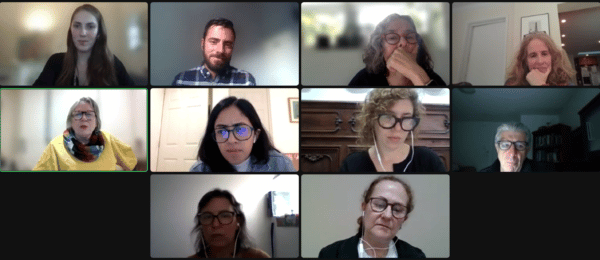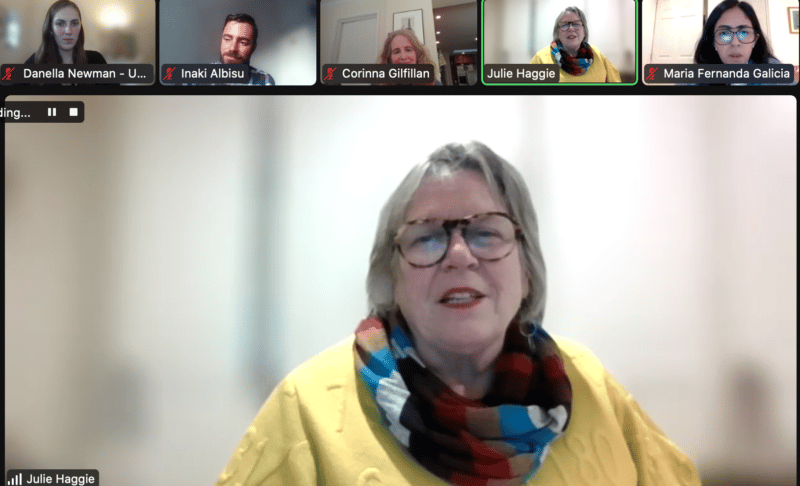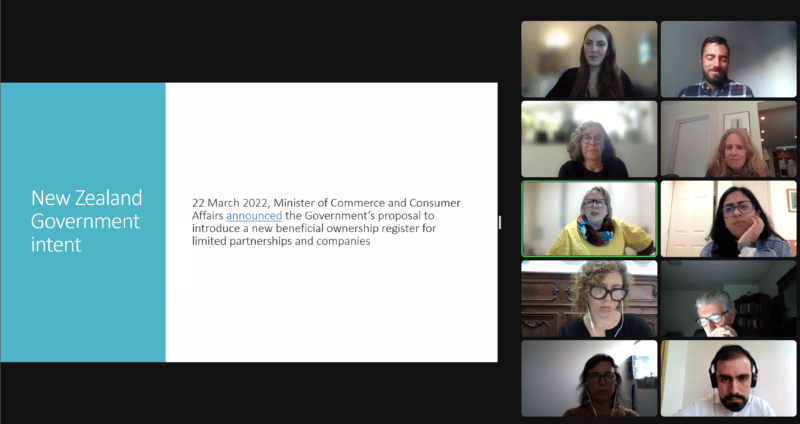24 October 2022 –
The increasing complexity of transnational business relationships, the digitization and decentralization of financial institutions, and the ease of doing business in multiple countries and jurisdictions, has made it more difficult for states and citizens to prevent money laundering and identify those who profit from corruption. Corruption is carried out in complex networks of financial flows and varying forms of ownership and control, in which opacity, rather than transparency, is the norm. Civil society organizations all over the world are advocating for a massive change, calling on their governments for more transparency when it comes to beneficial ownership.

Despite being a complex and technical issue, beneficial ownership transparency is now at the forefront of civil society advocacy in Latin America and the Caribbean. The 8th Regional Meeting for Coalition members and affiliates from the region presented a space for these organizations to share their experiences and speak about the next steps in making beneficial ownership opacity an exception, rather than the norm, in the region.
Beneficial ownership and the UNCAC
According to the Inter-American Development Bank, a beneficial owner is the person who “effectively owns, controls or benefits from a legal entity or arrangement. This control or economic benefit may be exercised through shareholder control or controlling interest in a commercial company, or through significant decision-making capacity within an entity. While being a beneficial owner is not in itself a crime or a corrupt act, the opacity of beneficial ownership, even considering miniscule ownership percentages, opens the door for the corrupt to create one or more degrees of separation between the corrupt act and the beneficial owner, using that minority ownership as a tool.”
The UNCAC recognizes the importance of transparency of beneficial owners and directors of legal persons to prevent corruption and money laundering. In Article 12 on the prevention of corruption in the private sector, it calls on States Parties to take measures to publish the identity of natural and legal persons involved in the formation and management of companies. In Article 14 on the prevention of money laundering, it requires the development of regulatory and supervisory regimes for the financial system including, among other recommendations, the identification of beneficial owners of their clients and of legal persons involved in the transfer of assets in formal and informal ways. In Article 52, the Convention calls on States Parties to require financial institutions to identify the beneficial owners of funds deposited in high-value accounts, with an emphasis on the identification of politically exposed persons. The latter article also calls for transnational cooperation in identifying beneficial owners and suspicious cases.
At the 9th Conference of the States Parties to the UNCAC in 2021, Resolution 9/7 entitled “Enhancing the use of beneficial ownership information to facilitate the identification, recovery and return of proceeds of crime” was adopted. The resolution calls on States Parties to improve the way they collect beneficial ownership information and optimize the way that information is shared among relevant government agencies and with other States Parties.
However, both before the UN General Assembly and the Financial Action Task Force, members of the UNCAC Coalition have called for all beneficial ownership information to be public, timely, in open format, and accessible in centralized registries. Access to this information would allow journalists, NGOs and the general public to better monitor information and hold their governments accountable.
How transparent are Latin America and the Caribbean regarding beneficial ownership?
As a region, Latin America and the Caribbean presents a worrying case of “not going far enough” in terms of registering, monitoring, and publicizing information on beneficial ownership. Where a country may excel on one point, for example, the establishment of a comprehensive registry with a clear definition of beneficial ownership, it may be lacking in its enforcement capacity or the publicity of said registry. This was the consensus of both the Latin American Financial Action Task Force (GAFILAT) and the Caribbean Financial Task Force (CTATF).
According to a 2020 study by GAFILAT (reviewed by the NGO Tax Justice Network), 60% of Latin American countries are “mostly compliant” with its Recommendation 24 on beneficial ownership transparency. However, no country complies with the recommendation 100%, with GAFILAT signaling that there are still many deficiencies in beneficial ownership transparency regulation in the region. Similarly, a December 2021 study by the CFATF noted that Caribbean countries have serious deficiencies in the disclosure of beneficial ownership information, especially around international investors, who still have special bank secrecy privileges in some jurisdictions.
It is in this context that civil society organizations in Latin America and the Caribbean are advocating for beneficial ownership transparency. The Regional Meeting presented three cases, two regional and one from the Asia-Pacific region, of how civil society organizations are engaging in the reform of beneficial ownership structures.
New Zealand: authorities acting on international recommendations and civil society advocacy
Despite not being from the Latin America and Caribbean region, Julie Haggie, Executive Director of TI New Zealand, presented the experience of New Zealand concerning a new initiatives to improve beneficial ownership transparency.

In March 2022, the Minister of Commerce and Consumer Affairs announced a proposal that would introduce a new beneficial ownership register for limited partnerships and companies. In parallel, the Ministry of Business, Innovation and Employment published the Cabinet’s decision to create a unique identifier for directors of companies, general partners of limited partnerships, and beneficial owners of these entities.
According to TI New Zealand, the initiative came on the heels of years of pressure from civil society and international organizations for New Zealand to better regulate beneficial ownership. For example, in 2018, TI-NZ participated in a consultation on beneficial ownership transparency. Also, in 2021, the Financial Action Task Force (FATF)’s Mutual Evaluation Review of New Zealand highlighted the lack of beneficial ownership information as a key deficiency in its anti-money laundering framework. Both of these inputs are contained in the proposed reforms.
Julie highlighted that the proposals are a big step forward for New Zealand. On the one hand, the proposed register for beneficial ownership encompasses effective corporate control, beyond mere ownership. This means that persons with decision-making authority in a company would also have to register. Excluding personal data related to beneficial owners, the proposal contemplates making information on beneficial owners, directors and general partners publicly available. Companies will have to do their due diligence to verify that the information given to the register is correct.

While the proposal is still in its infancy, TI New Zealand will continue to monitor its development and offer relevant information if consulted. Julie and her colleague Adam Hunt spoke more in detail on this topic in the Asia-Pacific Regional meeting. You can read more about Beneficial Ownership in the Asia-Pacific region, here.
Brazil: taking academia and civil society to Congress
Anti-corruption advocacy is difficult to carry out alone, especially in a big country like Brazil. Transparência Internacional Brasil (TI Brasil) understood this, and joined forces with 173 academic and civil society organizations and local governments, and more than 200 experts and academics to develop a set of anti-corruption measures that they presented to Congress.
André Amaral, Head of Government Relations at Transparência Internacional Brasil, shared TI Brasil’s experience in the regional meeting. The bill that was presented to Congress contained 70 anti-corruption measures, dubbed the “New Measures Against Corruption“. It was formulated in a collaborative manner with all the organizations and experts involved, and was followed-up by several meetings with congresspersons so that they could better understand the bill they were voting for.
André spoke about “Measure number 13” on beneficial ownership, which the proposal drew from EU and US regulations, aiming to provide a registry system for beneficial ownership that is neither too complex nor too onerous on existing state structures.
As of the time of the regional meeting, Bill 77/2019 had not received much attention from Congress. TI Brasil is aware of the uphill battle for Congress to legislate on matters either left to state bureaucracies or federal regulators. Also, an upcoming federal election has paralyzed legislative work but, as André hopes, transparency and corruption is still a hot issue among voters.
TI Brazil recently produced and published a civil society parallel report on the implementation of the UNCAC in Brazil. You can read the report, here.
Chile: civil society actively monitoring ambitious beneficial ownership reform
Civil society in Chile has likewise assumed an important role as monitors of beneficial ownership reform. Maria Jaraquemada, Executive Director of Chile Transparente, gave a brief summary of new efforts by government agencies to improve beneficial ownership transparency.
Chile currently has a register of beneficial owners in the Financial Analysis Unit (UAF), which contains information on financial entities and some companies. The information is not made public, nor does the UAF have the authority neither to demand more detailed information from those registered, nor to publish the information they have. Some advances have been made, for example, by increasing the types of obliged subjects, including beneficial ownerships disclosures, in the official public procurement platform, but transparency is still lacking.
Through the Open Government Partnership, following an OECD report with recommendations on the subject, civil society organizations submitted a series of recommendations to improve the integrity of the current beneficial ownership registry. This, María claims, laid the ground work for a recent fiscal and tax reform bill, to include beneficial ownership transparency provisions.
The new bill contemplates a public registry of beneficial owners among its anti-laundering and anti-evasion measures. A notable point in this matter is the mandatory publication of beneficial ownership information for those who own at least 10 percent or a legal person who has effective control of it. This takes into account legal persons, but also entities including investment funds or legal agreements that form legal structures. The bill also includes new dispositions to sanction violators of the law, including a structure for fines.
Conclusions and way forward
Beneficial ownership transparency is crucial for any integral anti-corruption policy to succeed. As business and legal structures get more complex and globalized, citizens and governments need to be able to identify who is set to gain from transactions aimed to mask money laundering of profits from crime and corruption.
Yet, as all the presenters mentioned at some point, it is difficult to get the general public to understand or care about a technical issue such as beneficial ownership transparency. Where there is no public pressure, civil society advocates and watchdogs must find ways to work with governments, present clear and informed reforms, and keep citizens informed about changes to beneficial ownership transparency.
The UNCAC provides a clear legal framework through which to spearhead reforms to better monitor and publicize beneficial owners. States Parties must spearhead the call of the UNCAC and act, together with civil society and the citizenry, to shed light onto who really wins from opacity.
UNCAC Coalition tools to make the UNCAC Implementation Review Process more transparent and inclusive
Beyond the lively conversation about beneficial ownership, Danella Newman from the UNCAC Coalition also provided a panorama of the panoply of tools that the UNCAC Coalition has developed to make the UNCAC Implementation Review Process more transparent and inclusive to civil society organizations and citizens.
1. UNCAC Review Status Tracker
– an easy-to-use tool that permits users to access up-to-date information about the review status of all States Parties to the Convention. It goes further, by also including information about which States Parties have signed the Transparency Pledge and, importantly, if they are compliant to it, if the focal point for the country review is known, and if a parallel report has been produced for this country.
- This tool is particularly relevant in the region, as 23 review processes are currently ongoing in Latin America and the Caribbean.
- Check your country’s review status and get involved!
2. Transparency Pledge
– a commitment to be signed by States Parties to the UNCAC to uphold six principles aimed to make the review process more transparent and participative.
- Of the 33 signatory States, only 5 (Argentina, Chile, Honduras, Peru and Mexico) are from the region.
- Check the UNCAC Review Status tracker to see if they are complying with it and hold them accountable. If your country has not signed the Pledge yet, but its 2nd cycle review is ongoing, then advocate for them to sign it and get involved in the review process.
3. Guide to Transparency and Participation in the UNCAC Implementation Review Mechanism
– a road map for both States and civil society highlighting best practice examples of transparency and civil society participation at different stages of the UNCAC review process.
4. Access to Information Campaign
– a campaign for more accountability and transparency in the UNCAC review mechanism, where CSOs around the world use the Coalition’s ATI template to request essential information and documents on both the 1st and 2nd UNCAC review cycles and track levels of transparency and compliance with ATI legislation globally.
- CSOs from only four countries from the region have participated in the campaign (Argentina, Brazil, Ecuador, Mexico). None of the requests was fully successful – all were responded to in only a partial manner.
- Any civil society organization or anti-corruption activist can join the campaign. Write to ati@uncaccoalition.org to express your interest in participating!
5. Civil Society Parallel Reports
– the Coalition supports CSOs from ODA-recipient countries in producing parallel reports on the implementation of Chapters II and V of the UNCAC to look at the implementation of the Convention’s provisions in practice.
- In Latin America and the Caribbean, there are published parallel reports from CSOs from the following countries: Argentina, Ecuador, Costa Rica, Paraguay, Colombia, Honduras, Brazil. CSOs are currently writing parallel reports on: El Salvador, Mexico, Chile, Perú, and for Puerto Rico (a pilot project to hold subnational governments to account for UNCAC implementation).
- The call for applications for support to write a parallel report is currently closed but will likely reopen soon.
Additionally, the UNCAC Coalition is carrying out comparative research to look at the good practices and lessons learned from other anti-corruption monitoring mechanisms that could inform our efforts to strengthen the UNCAC’s Implementation Review Mechanism (IRM).
If you have experience working on anti-corruption monitoring mechanisms that could be useful to inform this research or you would like to learn more, please get in touch with Corinna Gilfillan, corinna.gilfillan@uncaccoalition.org.



